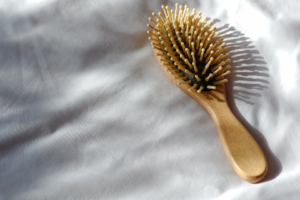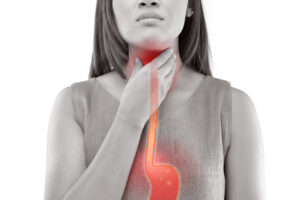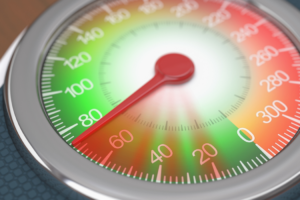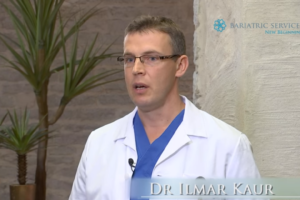Diarrhoea is an uncomfortable problem. Chronic diarrhoea can lead to fluid and nutrient deficiencies. There may be a number of non-pathological causes of diarrhoea following bariatric surgery.
Diarrhoea is one of the symptoms of dumping
Diarrhoea is one of the symptoms of early dumping syndrom Early dumping syndrome occurs when food moves from the stomach into the small intestine too fast. In this case, slower eating helps. Allow 20-30 minutes to eat one meal even when the portions are small.
Liquid diet in the first weeks
During the first weeks after the surgery, more liquid foods are eaten, which can cause diarrhoea. This problem will get solved if you start eating solid foods. If diarrhoea persists, the cause should be sought elsewhere, not in liquid food.
Impaired absorption of lactose, fructose and sugar substitutes
Fructose and sugar alcohols such as erythritol, xylitol, mannitol, and sorbitol can also cause diarrhoea.
Lactose intolerance can be acquired after gastric bypass in a small percentage of patients. After gastric bypass, milk passes directly through the gastric pouch into the small bowel at a much higher rate. The milk can overwhelm the available enzyme (lactase) and the lactose intolerance symptoms occur, leading to lactose intolerance as one of the side effects of bariatric surgery. The strategies to deal with lactose intolerance that develops will be to take milk products more slowly, eat thicker products such as yogurt or cheese rather than liquid milk, potentially avoid milk products all together, or take an enzyme substitute Lactaid with meals.
Coffee
Caffeine is a stimulant that makes you mentally alert, but also stimulates the digestive system. According to the International Foundation for Gastrointestinal Disorders (IFFGD), drinking 2-3 cups of coffee or tea a day can often cause diarrhoea. Many people also add other digestive stimulants to their coffee, such as milk, sugar substitutes or cream drinks, which further increase the laxative effect. By using plant-based milks, the laxative effect of caffeine can be reduced.
Other food intolerances
In addition to coffee and lactose intolerance, there may be a number of foods that can cause diarrhoea in case of intolerance.
Gluten. Gluten is found in wheat, rye and barley, also in many ready-to-eat meals. Therefore, in case gluten is suspected, it is not enough to exclude breads and cereal products from the menu, but the labels of ready meals must also be carefully read. Fortunately, allergens (including wheat, barley and rye) are marked in the text on food labels and are easy to spot.
Salicylates. Salicylates are found in many healthy foods, including fruits and vegetables, tea, coffee, nuts and spices. For most people, salicylates have health benefits because of their anti-inflammatory effects. However, for hypersensitive people they can cause problems. High in salicylates are spices, raisins and oranges, so you can observe if any of these foods can cause you diarrhoea.
Histamine. Amines are produced by bacteria during food storage and fermentation, and are found in lots of foods. Although there are several types of amines, histamine is most commonly associated with food-related intolerance. Histamine is a chemical in the body that plays a role in the immune, digestive and nervous systems. It helps protect the body from infections by creating an immediate inflammatory response to allergens. However, in case of histamine intolerance, the intake of foods such as fermented foods, wine, hard cheese, citrus fruits, avocado, dried fruits, and fermented beverages should be reduced.
Fatty and fried foods
This is important after bypass and mini bypass surgery, as in these cases the process of digesting fats has changed. Therefore, it is not recommended to eat fatty and fried foods as they can cause diarrhoea. Prefer low-fat meats, dairy products and fish, and minimize the proportion of ready-to-eat foods you can buy in groceries. Avoid foods deep-fried in oil, even if the food label says it is healthy.
Conclusion
Diarrhoea after weight loss surgery can be caused by fast eating and by consuming various foods. If your diarrhoea lasts for several days and shows no signs of regression or has become chronic, be sure to consult your doctor. A nutritionist can help you review your menu and possible causes, and recommend a suitable diet. To do this, you need to keep a diet-and-complaints diary on which to base further decisions.
Used sources:
Yves M Borbély, Alice Osterwalder, Dino Kröll, Philipp C Nett, and Roman A Inglin. Diarrhea after bariatric procedures: Diagnosis and therapy. World Journal of Gastroenterology, 2017 Jul 14; 23(26): 4689–4700.
Marek Jutel 1, Kurt Blaser, Cezmi A Akdis. The role of histamine in regulation of immune responses. Chem Immunol Allergy. 2006;91:174-87
Hanns-Wolf Baenkler. Salicylate Intolerance Pathophysiology, Clinical Spectrum, Diagnosis and Treatment. Deutsches Ärzteblatt Int. 2008 Feb; 105(8): 137–142.









